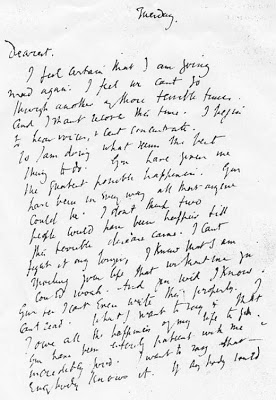Neuroscience
Virginia Woolf (1882-1941) was one of the foremost literary figures of the 20th Century, having produced several novels, short stories, and diaries. A number of traumatic events in her life, such as the death of her parents in her teens and sexual abuse at the hands of her half-brothers, may have contributed to the depression that plagued her throughout her life. Although her literary output remains largely unaffected, she was subject to periodic mood swings and associated illnesses until her suicide at age 59.
In a letter to her husband, regarded as her suicide note, she revealed a glimpse of life as a voice-hearer:

Transcript:
- Link Feast
Our pick of the best psychology and neuroscience links from the past week: Finding a Good Therapist Jules Evans' (author of Philosophy for Life and Other Dangerous Situations) recent encounter with a "somatic therapist" didn't go too well. Why...
- The Digest Guide To ... Happiness
10 years of the Research DigestYou can will yourself happier. Nathaniel Hawthorne likened happiness to a butterfly, "which, when pursued, is always beyond our grasp, but which, if you will sit down quietly, may alight upon you." Poetic but probably...
- Why Conservatives Are Happier Than Liberals
Psychologists at New York University say they've found the answer to why people with right wing political views are happier than left-leaning liberals (as previously indicated by survey research). In short, conservatives are less upset by inequality...
- Elsewhere
For when you've had enough of journal articles: 'A head injury changed my life': a former army cadet recalls life after a car crash. Is it wrong to teach children about feelings? The boredom epidemic affecting workers. A marriage devoted...
- What's Different About Those Who Attempt Suicide Rather Than Just Thinking About It?
Only a minority of people who think about committing suicide actually go ahead and make a suicide attempt. Is there something different about these people – some way, perhaps, to identify those suicidal people who are at most risk? Kate Fairweather...
Neuroscience
Virginia Woolf's Last Letter
Virginia Woolf (1882-1941) was one of the foremost literary figures of the 20th Century, having produced several novels, short stories, and diaries. A number of traumatic events in her life, such as the death of her parents in her teens and sexual abuse at the hands of her half-brothers, may have contributed to the depression that plagued her throughout her life. Although her literary output remains largely unaffected, she was subject to periodic mood swings and associated illnesses until her suicide at age 59.
In a letter to her husband, regarded as her suicide note, she revealed a glimpse of life as a voice-hearer:

Transcript:
Tuesday.
Dearest,
I feel certain that I am going mad again. I feel we can't go through another of those terrible times. And I shan't recover this time. I begin to hear voices, and I can't concentrate. So I am doing what seems the best thing to do. You have given me the greatest possible happiness. You have been in every way all that anyone could be. I don't think two people could have been happier till this terrible disease came. I can't fight any longer. I know that I am spoiling your life, that without me you could work. And you will I know. You see I can't even write this properly. I can't read. What I want to say is I owe all the happiness of my life to you. You have been entirely patient with me and incredibly good. I want to say that - everybody knows it. If anybody could have saved me it would have been you. Everything has gone from me but the certainty of your goodness. I can't go on spoiling your life any longer.
I don't think two people could have been happier than we have been.
V.
- Link Feast
Our pick of the best psychology and neuroscience links from the past week: Finding a Good Therapist Jules Evans' (author of Philosophy for Life and Other Dangerous Situations) recent encounter with a "somatic therapist" didn't go too well. Why...
- The Digest Guide To ... Happiness
10 years of the Research DigestYou can will yourself happier. Nathaniel Hawthorne likened happiness to a butterfly, "which, when pursued, is always beyond our grasp, but which, if you will sit down quietly, may alight upon you." Poetic but probably...
- Why Conservatives Are Happier Than Liberals
Psychologists at New York University say they've found the answer to why people with right wing political views are happier than left-leaning liberals (as previously indicated by survey research). In short, conservatives are less upset by inequality...
- Elsewhere
For when you've had enough of journal articles: 'A head injury changed my life': a former army cadet recalls life after a car crash. Is it wrong to teach children about feelings? The boredom epidemic affecting workers. A marriage devoted...
- What's Different About Those Who Attempt Suicide Rather Than Just Thinking About It?
Only a minority of people who think about committing suicide actually go ahead and make a suicide attempt. Is there something different about these people – some way, perhaps, to identify those suicidal people who are at most risk? Kate Fairweather...
